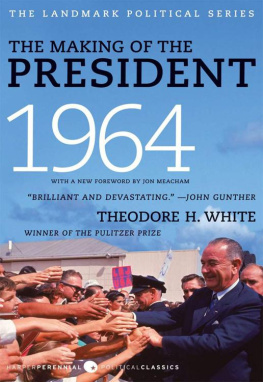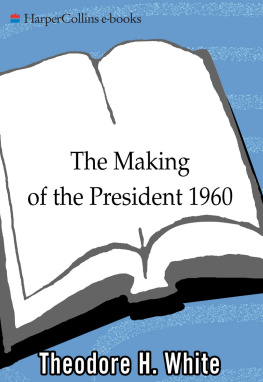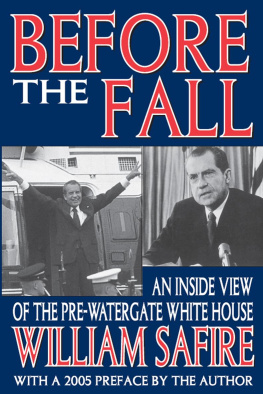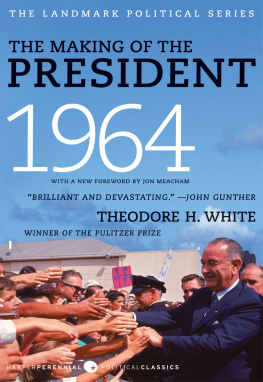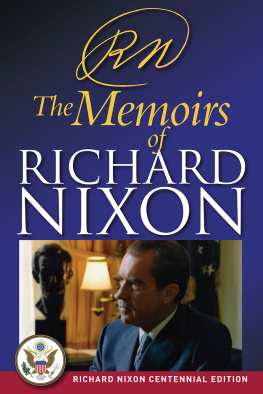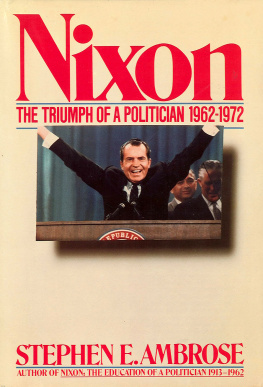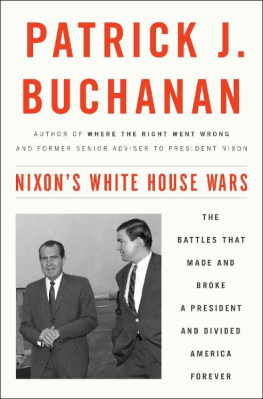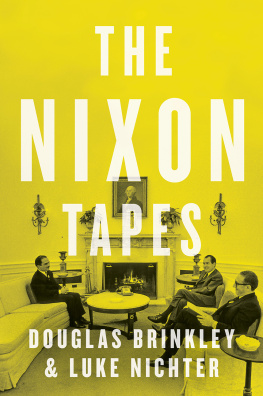THEODORE H. WHITE
THE
MAKING OF
THE PRESIDENT
1972

FOR
THEO BENNAHUM
whom I loved
19061972
CONTENTS
Its odd to read the words of this volumemany of them admiring, if not approving, of Richard Nixonknowing what happened next. Theodore Whites authors note is dated June 8, 1973, a few weeks before White House Counsel John Deans damning testimony before the Senate Watergate Committee. In another month we would watch Dean insist that it might be proven that the cover-up of crimes continued, and that it came from the president himself. In July 1973, Alexander Butterfield quietly told the committee that President Nixon had taped his conversations in the Oval Office. And the unraveling of the Nixon presidency became inevitable.
So it is odd, then, to read about the creation of the second term of that presidency, the tumultuous times that defined the 1972 campaign. And it is fascinating. For me, as I suspect for anyone of a certain age, these pages evoke an amused nostalgia for when we were young and ready to take on the world. I remember the eighteen thousand screaming fans ushered to their seats by the likes of Warren Beatty, Jack Nicholson, and Julie Christie at the Fabulous Forum in Los Angeles when James Taylor, Carole King, Quincy Jones, and Barbra Streisand sang out their souls for George McGovern. But even then, as the crowds around us roared, those of us with any political sense knew that Richard Nixon was right on Election Day when he told Theodore White: The election was decided the day McGovern was nominated. Once the Democrats made that choice, the president judged as he flew across the country to watch the returns at the White House, the question after that was only how much. McGovern did to his party what Goldwater did.
But Nixon wasnt able to do for his party what Franklin Roosevelt did for his; he wasnt able to create the new majority he sought. Even as the president piled up one of the biggest landslides in history, White tells us the President was bothered; the results nagged because he couldnt bring the Congress, or ultimately the people, with him. While Nixon trounced his rival by the astounding margin of 61 percent to 38 percent, Republicans actually lost seats in the Senate and gained only twelve in the House of Representatives, leaving both houses well in the hands of a Democratic majority. The voters had sent a strong message to Washingtonthey were rejecting George McGovern more than they were electing Richard Nixon and the policies he stood for.
By Election Day the bare outlines of the Watergate scandal were known. The botched burglary of the Democratic National Committee in June had already been traced to the Committee to Re-Elect the President, gleefully dubbed CREEP by Nixon-haters. By October, more than threequarters of the voters told pollsters that they had heard of the scandal, though most dismissed it as just politics. Still, White muses, Watergate might have led to an unprecedented pattern of voter turnout: in several states more people cast their ballots for governor or senator than for president. And most of those ballots went to Democrats, but that didnt just happen by chance. Democratic Party leaders looked ahead at what they knew would be a debacle in November and took action. My father, Hale Boggs, was the majority leader of the House at that time. He and Hubert H. Humphrey, the former vice president and defeated 1968 Democratic nominee, mounted a frantic fall road trip in support of congressional candidates. In fact, the last time I ever saw my father was at a fund-raiser in Los Angeles, where he and Humphrey outdid each other in their purple pleas for the party. Shortly after that, while campaigning for Nick Begich, an endangered Democratic house member in Alaska, the plane carrying my father and Begich disappeared, never to be found. (In the 2008 election, with Republican Governor Sarah Palin on the national ticket, Begichs son Mark was elected as Alaskas first Democratic senator in eighteen years.)
The race for Congress was the one arena in the crazy campaign of 1972 where party leaders and organized labor could play a role. The AFL-CIO refused to endorse McGovern, ostensibly over his anti-Vietnam war stance. But White gives us one instance after another where labor and elected officials were excluded from the march that ended with the nomination of McGovern. And that offensive provides the heft of Whites story; its all herestarting with the commission formed by the Democratic convention of 1968 and chaired by McGovern that changed the rules for delegates, working through the primaries and caucuses and state conventions; and ending at the raucous Democratic convention in Miami, where the candidate cooled his heels until almost three oclock in the morning waiting to make his acceptance speech while a parade of delegates insisted on having their say about minute details. I still laugh remembering my mothers wisecrack as we witnessed that convention from the prime real estate of my fathers box. Scanning the scene, she fixed her gaze on one particular delegate and stammered, Why would anyone wear shorts that short? My husband, Steve, who was part of the team covering the convention for the New York Times, remembers his fiercely antiwar, pro-McGovern father looking at the chaos on television and concluding, Theres nobody there who looks like me.
A lot of America felt that way, despite the fact that 60 percent agreed with the basic thrust of the convention and the raison dtre of the McGovern candidacythat the Vietnam war was a massive mistake. (Though White cant resist telling us that McGovern decided to run for president in 1962 long before the war was ever an issue. The reason? He had read The Making of the President 1960, and he thought hed go for it.) But even as Nixon continued to wage war, mining the North Vietnamese ports and bombing Hanoi and Haiphong, he talked peace. And he walked it as welldazzling White with his opening to China and his trip to Moscow, the first ever for an American president.
Theodore White had covered China for Time during and after World War II, and was a legitimate expert on that vast nation. Traveling with Nixons press corps back to the country in 1972, White saw the China trip as the momentous occasion that it was, nothing less than closing an epoch of postwar foreign policy. The promise that Nixon offered in foreign policy, and his attempts at a pragmatic approach to domestic policy, understandably attracted not only the author but also the American people. Thats why Watergate created such a breach of faitha phrase that would become the title of Whites next book, published in 1975.
But the full extent of Watergate was not yet known as the campaign of 1972 marched on toward Election Day. As Nixons team ran ads highlighting the presidents foreign visits, interspersed with staged ralliesand certainly no messy press conferences or interviewsthe McGovern operation imploded in plain sight. In chronicling first the embarrassment over Thomas Eagletons selection as running mate, and then the frantic search for a substitute after unceremoniously dumping Eagleton from the ticket, White provides some juicy stories I had long since forgotten. And putting together the predictable frustration of the losing candidate with the press with Nixons longstanding hostility to the news mediaallows the author an opportunity to do a riff () on the power of the press at the time. Reading his thoughts makes an old-fashioned reporter like me yearn for the good old days, when newspapers were profitable and network news was watched by fifty million adults nightly (about half that number tune in today).
Next page

